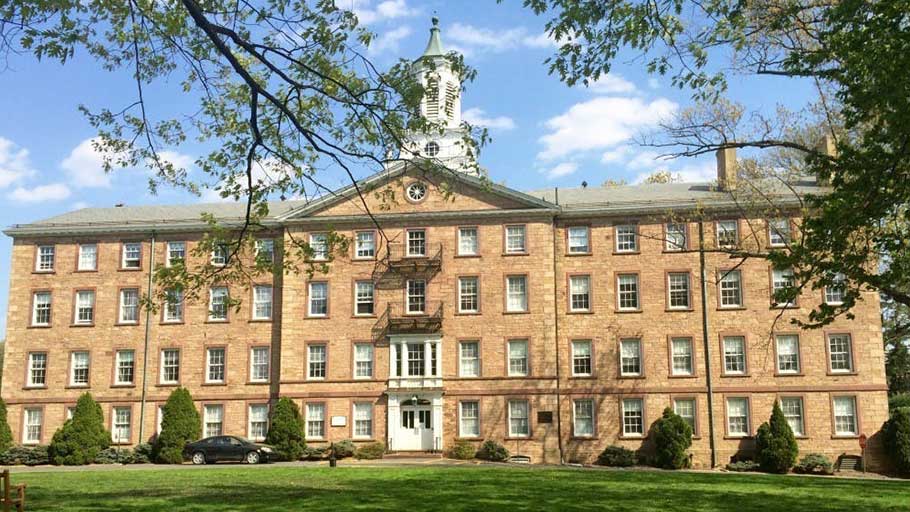Princeton Theological Seminary pledged last week to use $27.6 million of its endowment to pay reparations for the school’s historic ties to slavery, believed to be the largest amount ever paid by a school to atone for benefiting from the slave trade.
The school’s black student association says it’s “a great start, but not enough.”
The Association of Black Seminarians at Princeton Theological Seminary — a student group that helped raise the slavery reparations issue at the school — plans to call for at least $120 million more in slavery reparations along with money for current African-American students and other changes, the association’s president said.
“We are going to announce our official response next week and then submit our discrepancies to president’s office,” said the Rev. Nicholas Young, a master’s student and president of the Association of Black Seminarians at Princeton Theological Seminary.
The group argues Princeton Theological’s own research concluded about 15% of the school’s current endowment is tied to profits made from investments and donors tied to slavery.
“True repentance would require the institution to give back at least what has been unjustly acquired. Fifteen percent of the endowment is $147 million,” the student group said.
The group called on Princeton Theological to provide restitution to African-American alumni and current students and invest in impoverished communities. The group also wants the seminary to come up with a plan change the names of buildings honoring slave owners or people who supported white supremacy.
Princeton Theological officials made national headlines this week when they announced the school’s trustees voted Friday to approve a multi-year slavery reparations plan that will set aside $27.6 million of its endowment for new scholarships, programs and other changes.
The announcement comes as colleges, lawmakers and presidential candidates have been talking about ways for institutions and the government to come up with a payment plan to help the descendants of slaves or those still affected by the aftermath of slavery.
“We are committed to telling the truth. We did not want to shy away from the uncomfortable part of our history and the difficult conversations that revealing the truth would produce,” said Princeton Seminary President M. Craig Barnes.
The 360-student school, which is not part of neighboring Princeton University, was founded in 1812 to train Presbyterian ministers and is the second-oldest seminary in the country. A historical audit found the school never owned slaves and slave labor was not used to build its campus. However, the seminary took money from donors and invested in banks that profited from slavery.
Several of the school’s founding faculty and other leaders used slave labor and many were involved in the American Colonization Society, which advocated sending freed slaves to Liberia in Africa.
The reparations plan approved by the trustees includes:
-Funding 30 scholarships and five doctoral fellowships for descendants of slaves or students from other underrepresented groups.
-Hiring a new professor focused on African-American life along with a full-time director of a new Center for Black Church Studies.
-Naming the library after Theodore Sedgwick Wright, the school’s first African-American student and graduate.
-Naming the Center for Black Church Studies after Betsey Stockton, a missionary and educator who was once a slave owned by the chairman of the seminary’s board.
-Changing the seminary’s curriculum to reflect what the school learned about its ties to slavery.
Princeton Theological officials said they did not set out to come up with a single dollar figure that would make up for the school’s ties to slavery. Instead, the $27.6 million figure was arrived at after calculating how much the proposed scholarships and other programs would cost to support every year in perpetuity.
“The task force did not begin with a dollar figure in mind. We set out to make a generational change. All of the recommendations together – the curriculum changes, community partnerships and financial assistance – all work together to make, what we hope is, a significant difference that has impact well beyond our campus and well into the future,” said Anne Stewart, the seminary’s vice president for external relations and a member of the task force that came up with the plan.
The seminary’s endowment topped $1 billion in fiscal year 2018, making it one of the largest college endowments in New Jersey, behind Princeton University and Rutgers University.
Though no one keeps strict records, Princeton Theological officials said they believe the $27.6 million will be the largest amount ever paid for slavery reparations by a higher education institution.
State Sen. Ronald Rice, who leads New Jersey’s Black Caucus, said he was uplifted and encouraged by the seminary’s move to pay reparations at a time when it often feels like the nation is losing its conscience.
“It is a powerful reminder that truth and justice are central to our American ideal and it gives us hope that although laws can’t change hearts, hearts can change laws,” Rice said in a statement.
Colleges around the country have been struggling with how to address their historic ties to slavery.
Both Rutgers and Princeton recently issued reports addressing their slavery ties and the reverberations of racism. Both schools made some changes, including new names for buildings at Rutgers and new portraits and monuments at Princeton. But neither school proposed paying reparations to the descendants of slaves.
Other schools have explored the idea, though few have acted. The Virginia Theological Seminary created a $1.7 million fund for reparations this fall that will include helping descendants of slaves who worked at the seminary. A genealogist has started contacting some of the relatives of the estimated 4,000 slaves who worked at the school over several decades.
Georgetown University students approved a student referendum to adopt a $27.20 fee each semester to benefit the descendants of 272 slaves the school sold in the 1800s. But students protested earlier this semester, saying school officials have been slow to implement the plan.
This article was originally published by NJ Advance Media for NJ.com















